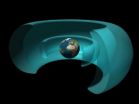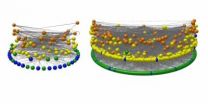(Press-News.org) West Orange, NJ. March 20, 2014. Kessler Foundation scientists collaborated with colleagues in Spain to study memory and learning in patients with Parkinson Disease (PD). They found that the Parkinson group's ability to learn new information was significantly poorer when compared with the control group. The article was published ahead of print on February 24: Chiaravalloti ND, Ibarretxe-Bilbao N, Deluca J, Rusu O, Pena J, García-Gorostiaga I, Ojeda N. The source of the memory impairment in Parkinson's disease: Acquisition versus retrieval. Movement Disorders 2014 Feb 24.
Lead author Nancy Chiaravalloti, PhD, is the Foundation's director of Neuropsychology, Neuroscience & Traumatic Brain Injury Research; John DeLuca, PhD, is senior VP of Research & Training. Their co-authors are affiliated with the University of Deusto, Bilbao, and Galdakao Hospital, Galdakao, Spain.
Memory deficits are common in persons with PD, even among those without frank dementia. "Traditionally, these deficits have been attributed to the patients' inability to retrieve information from their long-term memory," explained Dr. Chiaravalloti," which is called the 'retrieval failure hypothesis.' Some studies, however, document problems that are inconsistent with the retrieval failure hypothesis." To clarify the underlying mechanisms, this study focused specifically on learning abilities in a PD sample without dementia.
Researchers compared the performance of a PD group of 27 patients with a group of 27 matched healthy controls (HCs) on a neuropsychological test battery designed to assess new learning and memory. "We found a significant difference between the groups in their ability to learn a list of 10 semantically related words," noted Dr. Chiaravalloti. "However, no significant differences were seen between the PD and control groups in recall or recognition of newly learned material. We concluded that the memory deficit in patients with PD without dementia was caused by a deficit in learning new information. Improving new learning is an important factor to consider in the development of cognitive rehabilitation interventions in this population."
INFORMATION:
This study was supported by Kessler Foundation and the Health Department of Basque Government (2011111117; to N.I.B) and the Spanish Ministry of Economy and Competitiveness (PSI2012-32441; to N.I.B.).
Scientists at Kessler Foundation conduct cognitive research to improve cognition in individuals with multiple sclerosis, traumatic brain injury (TBI), stroke and dementia. Funding is provided by grants from the National Institutes of Health, National Institute on Disability Rehabilitation Research, National MS Society, NJ Commission of Brain Injury Research, Consortium of MS Centers, Patterson Trust, the Department of Veterans Affairs, Children's Specialized Hospital Foundation, Healthcare Foundation of New Jersey, Craig H. Neilsen Foundation and Kessler Foundation.
About Kessler Foundation
Kessler Foundation, a major nonprofit organization in the field of disability, is a global leader in rehabilitation research that seeks to improve cognition, mobility and long-term outcomes, including employment, for people with neurological disabilities caused by diseases and injuries of the brain and spinal cord. Kessler Foundation leads the nation in funding innovative programs that expand opportunities for employment for people with disabilities. For more information, visit KesslerFoundation.org.
facebook.com/KesslerFoundation
http://twitter.com/KesslerFdn
Carolann Murphy, PA; 973.324.8382; CMurphy@KesslerFoundation.org
Lauren Scrivo, 973.324.8384/973.768.6583 (cell); LScrivo@KesslerFoundation.org
Researchers identify impaired new learning in persons with Parkinson's disease
Kessler Foundation researchers collaborate with colleagues in Spain to study memory deficits in Parkinson's patients without dementia
2014-03-19
ELSE PRESS RELEASES FROM THIS DATE:
Analysis: Industry-sponsored academic inventions spur increased innovation
2014-03-19
Industry-sponsored, academic research leads to innovative patents and licenses, says a new analysis led by Brian Wright, University of California, Berkeley professor of agricultural and resource economics.
The finding calls into question assumptions that corporate support skews science toward inventions that are less accessible and less useful to others than those funded by the government or non-profit organizations.
The analysis, based on a study of two decades of records from the University of California system, is in today's science journal Nature.
The National ...
NASA's Van Allen Probes reveal zebra stripes in space
2014-03-19
Scientists have discovered a new, persistent structure in one of two radiation belts surrounding Earth. NASA's twin Van Allen Probes spacecraft have shown that high-energy electrons in the inner radiation belt display a persistent pattern that resembles slanted zebra stripes. Surprisingly, this structure is produced by the slow rotation of Earth, previously considered incapable of affecting the motion of radiation belt particles, which have velocities approaching the speed of light.
Scientists had previously believed that increased solar wind activity was the primary ...
Sometimes less is more for hungry dogs
2014-03-19
Hungry dogs would be expected to choose alternatives leading to more food rather than less food. But just as with humans and monkeys, they sometimes show a "less is more" effect. Thus conclude Kristina Pattison and Thomas Zentall of the University of Kentucky in the US, who tested the principle by feeding baby carrots and string cheese to ten dogs of various breeds. The findings are published in Springer's journal Animal Cognition.
The research was conducted on dogs that would willingly eat cheese and baby carrots when offered, but showed a preference for the cheese. ...
Alzheimer's prevention trial to monitor reactions to higher disease risk status
2014-03-19
PHILADELPHIA - A new clinical trial will soon begin testing whether early medical intervention in people at risk for Alzheimer's can slow down progression of disease pathology before symptoms emerge, as outlined in Science Translational Medicine. For the first time, people with no Alzheimer's disease symptoms will be told of their risk status before being asked to join the randomized controlled trial. As part of the overall prevention trial, Penn Medicine neurodegenerative ethics experts will monitor how learning about their risk of developing Alzheimer's impacts trial ...
NJIT physicist helps to discover a new structure in Earth's radiation belt
2014-03-19
An NJIT physicist is a collaborator in the discovery of a new structure in Earth's inner radiation belt -- a zebra-striped structure of highly energized electrons that could endanger humans in space and also damage low-earth navigation and communication satellites.
And surprisingly, the new structure is produced not by solar activity but by Earth's slow rotation. Scientists had previously thought Earth's rotation couldn't affect the motion of radiation belt particles. The data supporting these discoveries comes from a measuring device aboard the two NASA Van Allen Probes ...
Scientists describe gut bacteria that cause sepsis in preterm infants
2014-03-19
Researchers studying intestinal bacteria in newborns have characterized the gut bacteria of premature infants who go on to develop sepsis, a serious and potentially life-threatening condition caused by bacteria in the bloodstream. Their findings suggest new strategies for the early detection and prevention of severe bloodstream infections. The research was funded by several components of the National Institutes of Health (NIH)—the Eunice Kennedy Shriver National Institute of Child Health and Human Development (NICHD), the National Human Genome Research Institute (NHGRI), ...
Ancient food webs developed modern structure soon after mass extinction
2014-03-19
Researchers from the Santa Fe Institute and the Smithsonian Institution have pieced together a highly detailed picture of feeding relationships among 700 mammal, bird, reptile, fish, insect, and plant species from a 48 million year old lake and forest ecosystem.
Their analysis of fossilized remains from the Messel deposit near Frankfurt, Germany, provides the most compelling evidence to date that ancient food webs were organized much like modern food webs. Their paper describing the research appears online and open access this week in Proceedings of the Royal Society ...
NIH grantees sharpen understanding of antibodies that may cut risk of HIV infection
2014-03-19
What immune response should a vaccine elicit to prevent HIV infection? Two studies published online today bring scientists closer to answering this question by identifying previously unrecognized attributes of antibodies that appear to have reduced the risk of HIV infection in the only clinical trial to show efficacy, albeit modest, of an experimental vaccine regimen in people.
Earlier analyses of the results of that trial, known as RV144, suggested that antibodies to sites within a part of the HIV envelope called V1V2 correlated with reduced risk of HIV infection. These ...
Patients enjoy good quality of life 10 years after esophagectomy and gastric pull-up
2014-03-19
Beverly, MA, March 19, 2014 – Long-term survivors after esophagectomy with gastric pull-up can enjoy a satisfying meal and good quality of life according to a new study from a team of researchers at the University of Southern California Keck School of Medicine, Los Angeles. This study concluded that pessimism about the long-term quality of life after an esophagectomy on the part of treating physicians and patients is unwarranted. It is published in the Journal of Thoracic and Cardiovascular Surgery, an official publication of the American Association for Thoracic Surgery. ...
Texans are turning to a different kind of spirit -- vodka -- and saltier is better
2014-03-19
DALLAS, March 19, 2014 — Texans, known for enjoying local beers and Dr Pepper soft drinks, now have a growing beverage industry that would appeal to James Bond, who is well-known for enjoying a
good martini. Distillers are producing at least 17 Texas vodkas, researchers reported here today, and the most popular are, surprisingly, those that are a bit salty.
Their report, "Shaken not stirred, y'all: A comparison of select Texas vodkas," covered the results of group tastings on the vodkas, as well as some surprising facts about the state's alcoholic beverage market. ...
LAST 30 PRESS RELEASES:
Empty-handed neurons might cause neurodegenerative diseases
Black women hospitalised in USA with blood infection resistant to last-resort antibiotic at increased risk of death
NEC Society Statement on the Watson vs. Mead Johnson Verdict
Lemur’s lament: When one vulnerable species stalks another
Surf clams off the coast of Virginia reappear – and rebound
Studying optimization for neuromorphic imaging and digital twins
ORNL researchers win Best Paper award for nickel-based alloy tailoring
New beta-decay measurements in mirror nuclei pin down the weak nuclear force
Study uncovers neural mechanisms underlying foraging behavior in freely moving animals
Gene therapy is halting cancer. Can it work against brain tumors?
New copper-catalyzed C-H activation strategy from Scripps Research
New compound from blessed thistle promotes functional nerve regeneration
Auburn’s McCrary Institute, ORNL to partner on first regional cybersecurity center to protect the nation’s electricity grid
New UNC-Chapel Hill study examines the increased adoption of they/them pronouns
Groundbreaking study reveals potential diagnostic marker for multiple sclerosis years before symptom onset
Annals of Internal Medicine presents breaking scientific news at ACP’s Internal Medicine Meeting 2024
Scientists discover new way to extract cosmological information from galaxy surveys
Shoe technology reduces risk of diabetic foot ulcers
URI-led team finds direct evidence of ‘itinerant breeding’ in East Coast shorebird species
Wayne State researcher aims to improve coding peer review practices
Researchers develop a new way to safely boost immune cells to fight cancer
Compact quantum light processing
Toxic chemicals from microplastics can be absorbed through skin
New research defines specific genomic changes associated with the transmissibility of the monkeypox virus
Registration of biological pest control products exceeds that of agrochemicals in Brazil
How reflecting on gratitude received from family can make you a better leader
Wearable technology assesses surgeons’ posture during surgery
AATS and CRF® partner on New York Valves: The structural heart summit
Postpartum breast cancer and survival in women with germline BRCA pathogenic variants
Self-administered acupressure for probable knee osteoarthritis in middle-aged and older adults
[Press-News.org] Researchers identify impaired new learning in persons with Parkinson's diseaseKessler Foundation researchers collaborate with colleagues in Spain to study memory deficits in Parkinson's patients without dementia


